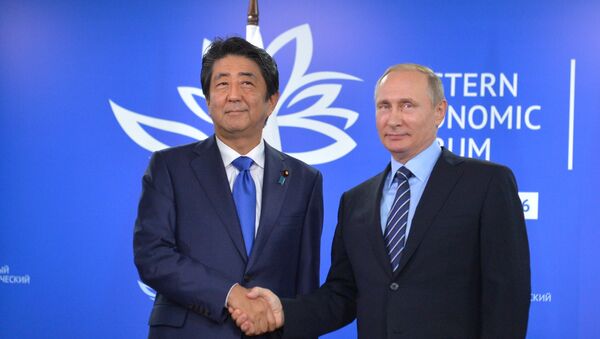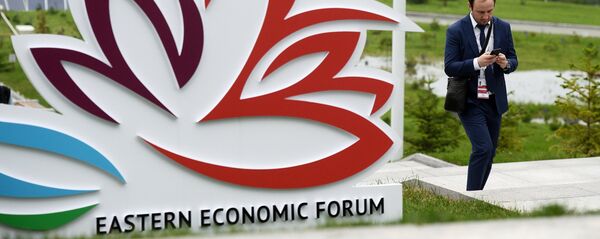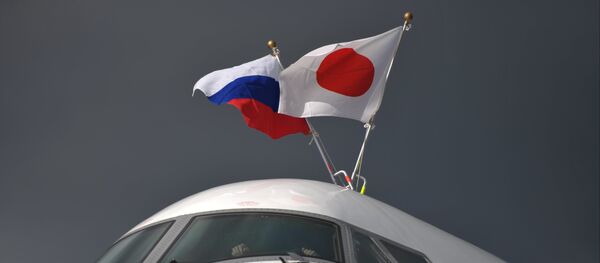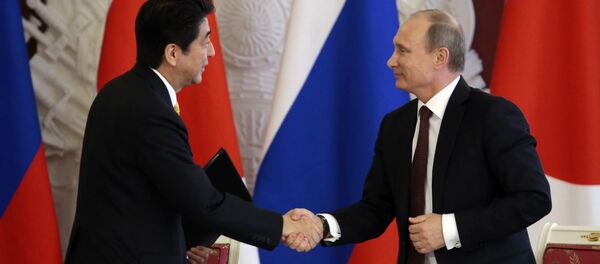MOSCOW (Sputnik) — The Soviet–Japanese Basic Convention defining the main principles of bilateral relations between the Empire of Japan and the Soviet Union was signed on January 20, 1925 in Beijing, and thus the diplomatic and consular relations between Moscow and Tokyo were established.
The relations were suspended on August 9, 1945, after the USSR declared war on Japan which was an ally of Nazi Germany. On October 19, 1956, Moscow and Tokyo signed a declaration on ending the state of war and restoring diplomatic relations.
On January 27, 1992, the Japanese government recognized the Russian Federation as the legal successor to the Soviet Union.
Russia and Japan maintain regular top-level dialogue. On April 28-30, 2013, Japanese Prime Minister Shinzo Abe paid an official visit to Russia. Abe became the first Japanese Prime Minister to officially visit Russia in 10 years. Following the the talks, the sides signed a joint statement dealing with a wide range of cooperation areas, including political, trade, investment, cultural, humanitarian and other spheres of cooperation. The document also mentioned bilateral cooperation in the context of most pressing international issues. Currently, the two countries are viewing this document as a "road map" of Russian-Japanese relations. After Abe's visit, Moscow and Tokyo agreed to launch a bilateral mechanism of consultations between the defense and foreign ministers in the 2 + 2 format.
In 2013, the sides held three more top-level meetings — June 17, on the sidelines of the G8 summit in Lough Erne, Northern Ireland; September 5, on the sidelines of the G20 summit in St. Petersburg and October 7, on the sidelines of the APEC forum in Bali.
On February 8, 2014, Sochi hosted another meeting involving Putin and Abe, who visited this Russian city to attend the opening ceremony of the 22nd Olympic Winter Games there. The two leaders discussed actual bilateral issues, including the possible use of Russian experience to hold the Tokyo 2020 Summer Olympics. They also discussed topical international issues, including Russian-Japanese cooperation in the fight against terrorism and illegal drug trafficking.
On September 21 and October 7, 2014, Putin and Abe held telephone conversations, at Tokyo's initiative and agreed to use various opportunities for holding new meetings on sidelines of international events. Acting in line with this approach, the two leaders met briefly October 17, 2014, during the Asia-Europe summit in Milan. On November 9, 2014, they met on the sidelines of the APEC forum in Beijing. They held a more detailed conversation on Russian-Japanese issues. Russian and Japanese leaders voiced their readiness to maintain contacts in all areas, including the work on a peace treaty.
On September 28, 2015, Putin met Abe on the sidelines of the UN General Assembly session in New York and discussed a wide range of bilateral issues.
On November 15, 2015, Vladimir Putin met with Japanese Prime Minister Shinzo Abe in Antalya, Turkey, on the sidelines of the G20 summit. The heads of states discussed mainly the development of bilateral trade and economic relations. They also focused on the issue of the peace treaty and agreed to achieve a mutually acceptable solution of the territorial dispute.
On September 2, 2016, Putin and Abe met in Vladivostok on the sidelines of the Eastern Economic Forum. The two leaders discussed the development of bilateral cooperation and interaction in the Asia Pacific. One of the outcomes of the meeting was the announcement of Putin's visit to Japan on December 15, which had been postponed from 2014.
In terms of trade and economic cooperation, relations between Russia and Japan have been following a negative trend. In fact, the bilateral trade dropped by almost one-third in 2015 compared to 2014. According to the Russian Federal Customs Service, Russian-Japanese trade totaled $21.31 billion in 2015, down from $30.77 billion in 2014, with Russian exports equal to $14.5 billion, a drop from $19.85 billion in 2014, and imports at $6.8 billion, falling from $10.92 billion.
In the first eight months of 2016, Russian-Japanese trade amounted to $10.11 billion, including $5.9 billion worth of Russian exports and $4.14 billion in imports.
In the wake of the crisis in Ukraine, Tokyo sought to demonstrate its solidarity with other G7 countries, which led Japan to take a number of unfriendly initiatives toward Russia in 2014, including restrictive measures against a number of high-ranking officials and major organizations. Russia retaliated in August 2014 by introducing visa restrictions against a number of Japanese citizens.
Nevertheless, it did not affect day-to-day, cultural and humanitarian ties in any meaningful way.
Cultural exchanges have always been one of the most vibrant areas of bilateral cooperation. The people of the two countries take great interest in exploring each other’s cultures. The Festival of Russian Culture in Japan has been held since 2006, providing an efficient communication channel. More than 13 million people have visited the festival since its founding. It features concerts, exhibitions and other cultural events across Japan, and thousands of Russian artists have contributed to it.
The Days of Japanese Culture are organized in Russia every spring and autumn. In 2018, Russia and Japan will hold a cross-cultural year.
Visa-free exchanges between residents of Russia’s South Kuril Islands and Japan started in 1992 under an intergovernmental agreement to facilitate people-to-people contacts and resolve issues related to the signing of a peace treaty between Russia and Japan. People only need their national passports with a special insert to cross the border.
Over 20,000 people from Japan have visited Kunashir, Shikotan, Iturup and the islands of the Lesser Kuril Ridge since 1992, and some 9,500 Kuril residents have traveled to Japan. In 2016, 802 people from Japan and 281 Kuril residents have used this program, and in 2015 the numbers were at 761 and 299, respectively.
These exchanges include not just ordinary citizens, but also environmental scientists, museum workers, doctors, etc.








